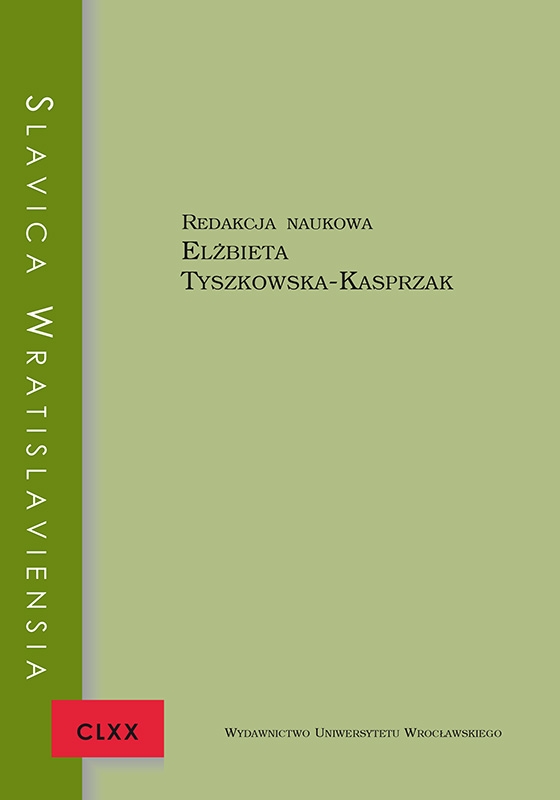

Artykuły

“We, Russians, do not know how to write novels at all…”: To the question of the national specifics of the genre
The article deals with the Russian novel of the 19th century in its top, classical patterns as a special typological branch of the novel genre, fundamentally different from European models. The author of the article proposes to look for the specifics of the Russian novel in his goal, which lies not so much in the field of the novel strategy of hero’s “education” Bildungsroman or in his “career” field, but rather in the problem of “the rehabilitation of a deceased man” Dostoevsky or turning the “old” man into the “new” one Goncharov, i.e. related to the issue of soul salvation. Since the “plot space” Lotman of the Russian novel is associated with a mythological, essentially infinite situation, the problem of the end, or death, is not significant, and death itself is fraught with a new life. In the European novel, which is dominated by a fairy tale and a happy or unlucky — as a variant end, the question is not worth it, and the hero travels without eschatological questions. The hero of the Russian novel is aiming for the work of salvation, for this he lives his earthly life. The Russian novel following European discoveries in the field of this genre аs an artistic pattern but mostly was addressed to non-novel sources. The article assumes that the “plot of salvation” in the Russian classic novel went back to three lines of development. To the Cervantes type of novel itself, when the hero-savior came to the world he easily became the killer. This model was least in demand and was embodied in the Idiot of Dostoevsky and partly in Goncharov’s Oblomov. The second line led to Dante’s Divine Comedy, with its idea of redemption and repentance of man in half of his earthly life and with the invaluable help of Earthly Wisdom the Virgil motif and Heavenly Wisdom the Beatrice motif. The indicated model was relevant for Pushkin’s Eugene Onegin, Gogol’s Dead Souls, and especially for Goncharov’s novels. The third line — the most demanded — went back to Goethe’s Faust and to the idea of saving everybody and everything, even those who did not seem to deserve it. The plot was organized around the hero of the Faustian type and his search for the fullness of being, primarily through Beauty. This model is relevant for most of the Russian classic novels, but above all for works in this genre of Lermontov, Turgenev, Dostoevsky and in part for Tolstoy.
„My, Rosjanie, w ogóle nie umiemy pisać powieści…”. Problem narodowej specyfiki gatunku
W artykule omówiona została powieść rosyjska XIX wieku w swoich najdoskonalszych klasycznych wzorcach jako szczególne odgałęzienie gatunku powieści, zasadniczo różniące się od modeli europejskich. Według autora opracowania specyfika rosyjskiej powieści wynika z jej nadrzędnego celu, który polega nie tyle na powieściowej strategii „wychowania” człowieka czy też w kształtowaniu jego „kariery”, ile na sproblematyzowaniu „odtworzenia człowieka, który zginął” Dostojewski bądź przekształceniu „starego” w „nowego” Gonczarow, czyli związana jest z problemem zbawienia duszy. Ponieważ „przestrzeń fabuły” Łotman powieści rosyjskiej wiąże się z mitologiczną, nieskończoną z założenia sytuacją, problem końca czy śmierci jest nieistotny, a sama śmierć zakłada pojawienie się nowego życia. W powieści europejskiej, zadowalającej się bajką i szczęśliwym bądź nieszczęśliwym — jako wariant zakończeniem, taki problem się nie pojawia, a bohater przechodzi drogę życia bez wnikania w problemy eschatologiczne. Bohater powieści rosyjskiej za cel obiera zbawienie i jemu poświęca swoją ziemską egzystencję. Powieść rosyjska, naśladując europejskie osiągnięcia w dziedzinie tego gatunku, wzorowała się w znacznym stopniu na źródłach niepowieściowych.
W artykule postawiono tezę, że „fabuła zbawienia” w rosyjskiej powieści klasycznej wywodzi się z trzech źródeł. Pierwszym jest powieść typu cervantesowskiego, w której na świecie pojawia się bohater-zbawca ten sam bohater mógł stać się oprawcą. Model ten był najrzadziej stosowany, a przykład może stanowić Idiota Dostojewskiego i częściowo Obłomow Gonczarowa. Drugie źródło to Boska komedia Dantego z jej ideą odkupienia i żalu za grzechy w połowie życia bohatera, w ziemskim systemie wartości i z nieocenioną pomocą Mądrości Ziemskiej motyw Wergiliusza i Mądrości Niebiańskiej motyw Beatrycze. Na modelu tym oparte zostały: Eugeniusz Oniegin Puszkina, Martwe dusze Gogola i w szczególności powieści Gonczarowa. Trzecie źródło tradycji, do której nawiązywano najczęściej, to Faust Goethego i idea zbawienia wszystkich, nawet jak by się wydawało niezasługujących na to. Fabuła budowana była wokół bohatera typu faustowskiego i jego poszukiwania pełni bytu, przede wszystkim dzięki Pięknu. Ten model jest charakterystyczny dla większości rosyjskich powieści klasycznych, ale głównie dla utworów w tym gatunku autorstwa Lermontowa, Turgieniewa, Dostojewskiego i w pewnym stopniu Lwa Tołstoja.